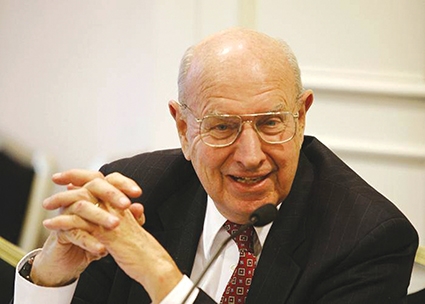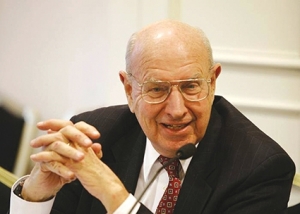Ambassador Thomas Pickering on the Decisions Made about Russia
Ambassador Thomas Pickering served more than four decades as a US diplomat. He last served as Under Secretary of State for Political Affairs, the third highest post in the US State Department. Pickering also served as Ambassador to the United Nations, the Russian Federation, India, Israel, and Jordan, and holds the personal rank of Career Ambassador (http://www.brookings.edu/experts/pickeringt).
Voice of America’s Georgian service reporter, Ia Meurmishvili, sat down with him in Washington for the following exclusive interview.
Would you agree with the notion that is shared by some experts in Washington that the ease Russia enjoyed after the 2008 war with Georgia lead us to the current crises in Ukraine and Syria?
One cannot divorce the connections that lead down that road. The Russians have chosen to operate in the way they have for mainly domestic reasons. I think that Russians had some feeling with respect to Georgia: they were in a position to play some kind of role, particularly in South Ossetia and in Abkhazia. Nobody gave them that role. They just put themselves there as so-called “peacekeepers.”
Why do you think there were no sanctions against Russia at the time? The West imposed punitive measures against Russia only after its military aggression in Ukraine and annexation of Crimea.
I think there were two reasons: one, the situation returned more or less to the status quo ante fairly quickly and, secondly, there were no sanctions possible at the UN Security Council as long as Russia had veto power. Therefore, it was not going to happen. My own sense was that perhaps others – both in Western Europe and the United States - felt that the sanctions would do more harm to Georgia and the United States than they would Russia.
Do you think it was the right decision?
I think to some extent it was. Western Europe in particular, and to a much lesser extent the United States, have big investments in Russia. So, the “war of sanctions” was not something that they thought would necessarily end very well. If in fact they decided to put some sanctions on in a way that protected their interests, they [the sanctions] would not have had any effect. What is interesting is that in Ukraine we have seen sanctions which are targeted and very specific. I think what people are losing sight of over Ukraine it that what is happening is President Putin’s failure to make key decisions to diversify Russia’s economy. For a long time Russia stayed as, and still is very much a prisoner of, what I call a “mono-crop-economy.” The mono-crop is hydrocarbons. They had the advantage of high prices and believed that they would never go down again. However, when they went down, even with the accumulation of savings of foreign exchange were not able to weather it. A diversified economy would have given them more opportunities. The inability of the Russian economy to effectively deal with falling oil prices is a real problem for Russia. If things keep on, low price diversification will not be possible because there is not enough investment funding to do that. I think it is a tragedy for the people of Russia.
You mentioned that Russia assumed a role in South Ossetia and Abkhazia that no one gave it. In light of this, how do you see Georgia’s relations with Russia? How do you think Georgia should deal with an increasingly aggressive Russia?
Since the conflict, Georgia has dealt with Russia carefully and correctly. And it should. But this doesn’t mean that Georgia should bow to every whim or wish of Russia. At the same time, it should build up a respectful relationship and do everything it can to normalize relations. Georgia is a very diverse country. It needs to find a way out, through the strength of its diversity, to build its unity in a democratic way.
There is a real strength in Georgia and Georgian nationalism. However, there is even more strength in having a growing, economically viable country and providing alternatives for the Abkhaz and South Ossetians – economic alternatives and linguistic alternatives and all the rest. I think in the long run the Georgians are “condemned” to living together rather than to decline separately. The re-unification of those portions of Georgia - that I hope are only temporarily separated - is a goal which I always thought Georgians were committed to. It is a goal which can only be achieved not through military force, but through the ability to convince people in South Ossetia and Abkhazia that the real future is in Tbilisi, not in Moscow.
Do you think joining NATO or the EU would speed up that process?
No. I think what will help is a strong, growing, thriving, confident Georgian economy. Those are the things that the people next-door would look at.
In the spirit of keeping good neighborly relations and to boost economic relations, Georgia re-instated a visa free regime with Iran, which had been suspended by the Georgian side. Do you think it is good for Georgia to have close ties with Iran?
I think having foreigners comment on Georgian foreign policy is not a good idea. I try to avoid it if I can. Georgia will settle its relations with Iran as it relates to a visa regime that Georgia thinks best. My own view has been that Iran has been isolated from the international community for 35 years. The opportunity to create an agreement that had the potential for resolving the challenge of the Iranian nuclear threat is a very important step forward. It’s not a perfect step and it took a lot of effort to get us there. What it does is to open a door to future steps and we may see a further incorporation of Iran into the international community rather than further isolation.
Ia Meurmishvili












